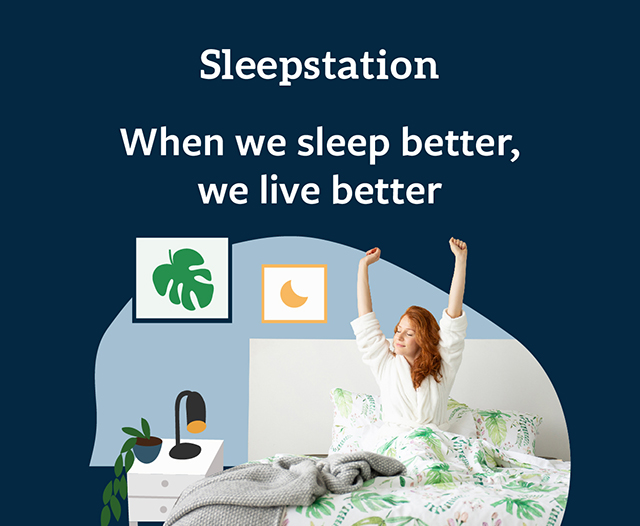
Venn PCN understands the importance of sleep and how poor sleep can have such a negative impact on health. For that reason, we decided to fund the Sleepstation programme for our patients. Sleepstation is a personalised online system dedicated to providing resources, support, and guidance to help you achieve better sleep and improve your overall quality of life.
If you are having sleep problems, there are simple steps you can take to improve your sleep hygiene, get into a daily routine and ease those restless nights.
Whether you're dealing with occasional sleep disturbances or chronic sleep issues, Sleepstation is here to help. Through education, personalized assessments, and evidence-based interventions, we aim to empower you to take control of your sleep health and experience the benefits of restorative sleep. Explore our resources and take the first step towards better sleep today. Together, we can work towards a healthier, happier, and more rested you.
Poor sleep has been shown to have negative effects on mood, memory, attention, decision-making, immunity and motivation.Sleep is often the first thing we sacrifice when life gets busy. However, when we prioritise sleep we become better equipped to deal with life’s challenges. Sleepstation can help you understand how to improve your sleep, giving you significant boosts in mood, concentration and performance.
Sleepstation has been supporting NHS patients in the UK to improve their sleep since 2012. Our online course will guide you through our scientifically proven solution and give you the knowledge, tools and confidence to control your sleep. You’ll be supported by our expert sleep team who can help you restore your sleep quickly.
Patients of Venn practices have NHS access to Sleepstation
Working Together

Bransholme Surgery
Bransholme Health Centre
Goodhart Road
Hull
HU7 4DW
Southcoates Surgery
225 Newbridge Road
HULL
HU9 2LR
Field View Surgery
840 Beverley Road
Hull
HU6 7HP
The Orchard Centre
210 Orchard Road
HULL
HU6 9BX
Elliott Chappell Health Centre
215 Hessle Road
HULL
HU3 4BB
The Quays
2nd Floor
Wilberforce Health Centre
6-10 Story Street
HULL
HU1 3SA
Riverside Medical Centre
The Octagon
Walker Street
HULL
HU3 2RA
East Park Practice
2nd Floor
Wilberforce Health Centre
6-10 Story Street
HULL
HU1 3SA

SLEEP BACKGROUND
Sleep problems can stem from various factors including lifestyle choices, stress, mental health conditions, medical issues, and environmental factors.
Common risk factors include irregular sleep schedules, excessive screen time before bed, anxiety or depression, sleep disorders such as sleep apnea or insomnia, and sleep disturbances due to chronic pain or medication side effects.
Symptoms of sleep disturbances may include difficulty falling asleep, staying asleep, waking up too early, or experiencing non-restorative sleep.
Sleep disturbances can progress through stages, ranging from occasional sleep disruptions to chronic insomnia or other sleep disorders, each presenting with distinct symptoms and impacts on daily functioning.
Diagnosis typically involves a comprehensive assessment of sleep patterns, sleep environment, medical history, and potential underlying causes of sleep disturbances.
Evaluation may include sleep diary tracking, sleep studies (polysomnography), and consultations with sleep specialists to accurately diagnose and address sleep disorders.
Treatment strategies vary depending on the underlying cause of sleep disturbances and may include lifestyle modifications (such as establishing a regular sleep schedule and creating a relaxing bedtime routine), cognitive-behavioral therapy for insomnia (CBT-I), medication options, and alternative therapies like relaxation techniques or acupuncture.
Caregiving for individuals with sleep problems requires patience and understanding. Providing a comforting environment, establishing calming bedtime routines, and promoting healthy sleep habits are essential. Monitoring sleep patterns, seeking medical advice when needed, and offering emotional support are crucial aspects of caregiving for those struggling with sleep disorders..
Ongoing research efforts aim to deepen our understanding of sleep disorders, identify novel treatment approaches, and develop innovative technologies for monitoring and improving sleep quality. Advances in sleep medicine, including wearable devices for sleep tracking, digital therapeutics, and pharmacological innovations, hold promise for advancing sleep health and enhancing overall well-being.